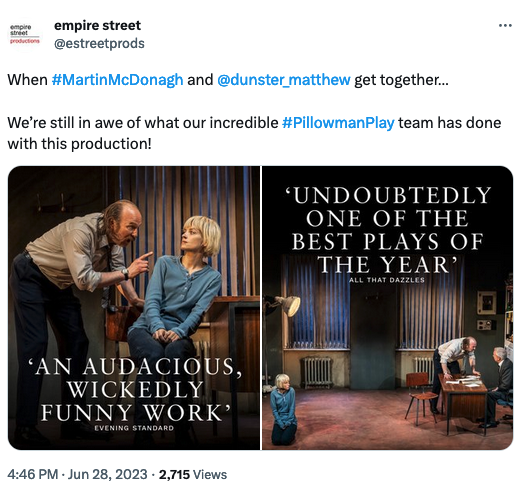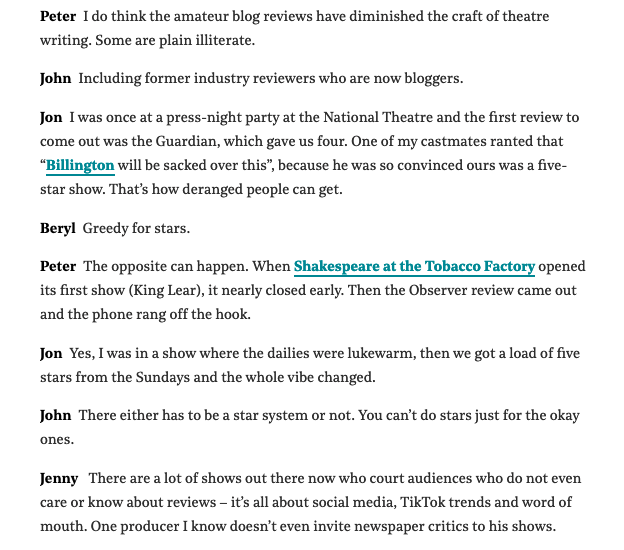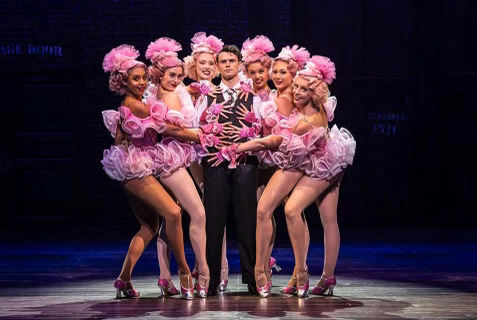Welcome to today’s edition of ShentonSTAGE Daily.
Apologies for the navel-gazing, but as a critic I am regularly exercised by worries about the future of my (now former) profession. (I say former PROFESSION, because I no longer make a living from it — fortunately I don’t have to, so I can treat it now just as a hobby; but I fear that the future of criticism is now entirely in the hands of hobbyists (and just occasionally, lobbyists).
That’s because, as far as the theatrical profession itself is concerned, there’s absolutely no difference between what used to be professional critics and hobbyist bloggers; indeed, Empire Street Productions, lead producers of the revival of THE PILLOWMAN that opened recently in the West End, last week tweeted this:

They thus gave equal credibility to a legacy print publication with a long-standing critic (even if the paper is now more of a pamphlet than a newspaper) and a blog that calls just about every show they see as ‘potentially’ or ‘undoubtedly’ of the best of the year, so it is utterly, utterly meaningless.
The Guardian’s former (and still much-missed) long-time theatre critic Michael Billington recently articulated the position brilliantly of why real, experienced critics still matter, in an interview with The Fence. He spoke of being urged by his then-editor Alan Rusbridger to actively engage in tweeting his opinions after a show: “He cited the example of the National Theatre: if a thousand people visit the National Theatre, then a thousand people all have an opinion – and I shouldn’t just be the only person licensed to have an opinion. They would all come out and tweet. And I would tweet too. And my tweet would be one of many. He talked about this a lot. I resisted this fiercely. I said that I’ve spent my life studying how to write reviews. It was bad enough writing overnight reviews and filing them by 11:30, but then to have to give an instant opinion at five minutes after the curtain? I don’t see any value to this. But that was his dream. We have to democratise opinion. It should no longer be the privilege of a select few. You can see why I resisted this. Not that I am antidemocratic, everyone is entitled to their opinion. But my whole philosophy is that criticism is a specialised art and it does require practice and discipline. It requires as much energy and clarity and wit than you can bring to your prose. That’s how I became a critic. I grew up in Leamington Spa reading about plays, books and shows that I could never get to.”

Billington also mentioned the insidious short-hand of the star rating. “That is the moment that criticism changed and it became part of a commercial market where you offer not a detailed analysis – but an instant guide. I’ve always thought star ratings were an abomination. I remember then they started to come in. We had meetings as critics. We told our editors that we didn’t like them. And they would say ‘Oh! we have to because the public love them’. Now they are part of the landscape. What they do is short circuit the readers’ response, and they don’t bother to fully engage with the review itself. There was a time when the Times discouraged critics giving three-star reviews on the grounds that three stars were a turn-off for the reader. This may not be still true, but they were encouraged to go for extremes. Three stars was negative for the reader. But so much art is three stars! It’s neither a masterpiece, nor is it an unassailable disaster. It’s no disgrace to have a three-star play.”
Yet TIME OUT has recently announced that its website (and it is now only that, no longer a print publication at all) will stop carrying negative reviews of “experiences” beyond 150 words, if critics don’t feel they can give them a rating of three stars or above. As Kate Maltby explained in a column for The Stage last week, “As one critic who writes for a different Time Out section said to me: ‘I’ve effectively been told that if I want more words published, I need to bump up a two-star rating to a three.’ The news, first reported by Private Eye but confirmed to me by Time Out insiders, is aimed at maintaining a “supportive brand” for advertisers – ie, in the case of big theatres, the stakeholders getting reviewed. The decision has the perverse effect of damaging many creatives involved in two-star shows. Sometimes, a production doesn’t work in the whole, but a talented teammate gets a boost by being the contributor a critic draws attention to as promising. Outright negative feedback, too, matters – it keeps the industry honest, it stimulates improvement. The greatest stifling will be of political dissent from a production’s project: you can hardly make a case as to why a West End show is perpetuating patriarchy, for example, in 150 words. It’s one thing for star ratings to replace criticism. It’s quite another for them to dictate who even gets space in the conversation.”
A Green Room discussion in The Stage amongst a group of actors of different ages and experience last week also touched on the star rating system — and the changing critical landscape they are a part of. Here is part of it:

SHOWS AHEAD IN LONDON, SELECTED REGIONAL THEATRES AND ON BROADWAY
My regularly updated feature on shows in London, selected regional theatres and on Broadway is here: https://shentonstage.com/theatre-openings-from-w-c-july-3-2023/

I’m looking forward to revisiting CRAZY FOR YOU tonight at the Gillian Lynne Theatre on its official transfer there after a season last summer at Chichester Festival Theatre (pictured above; and to seeing the return of THE WIZARD OF OZ to the London Palladium, opening officially on Thursday, where this adaptation originally also played back in 2011, but now directed by Nikolai Foster, not Jeremy Sams.
See you here on Friday
I will be here on Friday. If you can’t wait that long, I may also be found on Twitter (for the moment) here: https://twitter.com/ShentonStage/ (though not as regularly on weekends)
